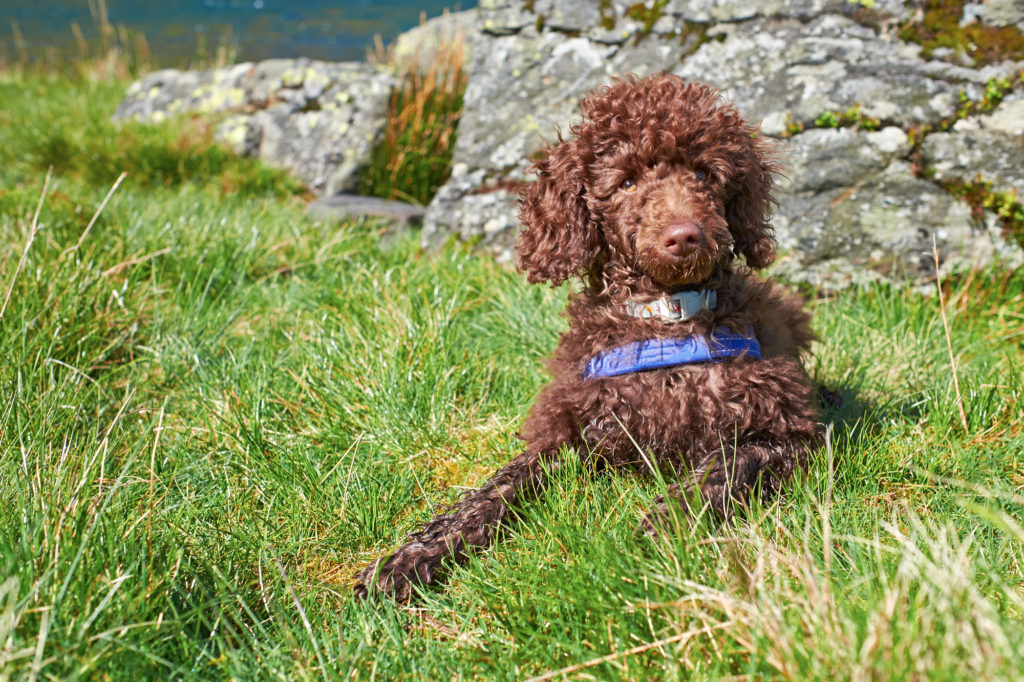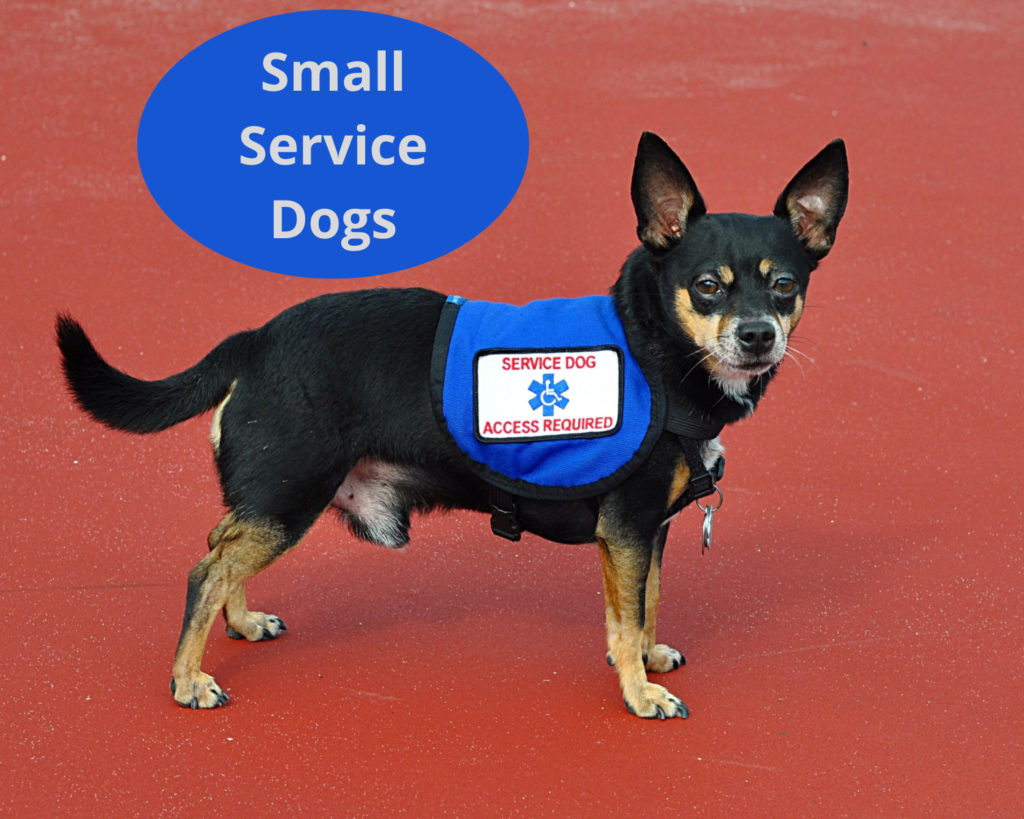Most of the time, when one hears about service dogs, the breeds in question are typically medium or large in size. This is because many service dogs have physical requirements so they can perform strength-related tasks or stay sturdy to offer balance and stability to their owners.
But that doesn’t mean that no small service dogs exist!
If your life and disabilities are more suited to a smaller dog, there are certainly some good options available out there for you. Here are the best small service dog breeds.
Best Small Service Dog Breeds
A good small service dog will be trainable, intelligent, loyal, and sharp to be able to perform the tasks required of them.
Today, we’ll be covering the following on our list of the best small service dog breeds, as they have these qualities!
- Pomeranian
- Poodle
- Yorkshire Terrier
- Chihuahua
- Miniature Schnauzer
- Havanese
What Are The Tasks Of A Service Dog?
Service dogs can have a wide range of tasks. Most will be trained to accommodate or respond to a specific person’s needs. This training process means they tailor their job to a unique individual.
Those who qualify for the use of a service dog may have a mental or physical disability, or they may have a mix of both.
Regardless, they have needs that mean a service dog will make life more accessible and easier to navigate for them.
For some, their service dog is so essential to their life that being without one could put them at risk of serious medical problems or could even be fatal.
Examples Of Service Dog Tasks
Basically, the exact tasks of a service dog will heavily depend on the person it’s assigned to. Some examples of tasks a dog in this job may perform include:
- Aiding deaf and hearing-impaired individuals by responding to doorbells, phones, or speech from others or directing their owners to sources of noise.
- Guiding blind and visually impaired individuals across streets, through doors, in crowds, and in other situations that may require visual assistance.
- Providing deep-pressure therapy as psychiatric aid to individuals with severe anxiety, PTSD flashback, or overstimulation from neurodivergence.
- Offering comfort, feelings of safety, and socialization experience to individuals on the ASD spectrum, as well as helping to comfort or calm them during meltdowns.
- Learning to contact emergency services and get quick help by using specially designed communication devices.
- Alerting an individual with diabetes about low blood sugar.
- Alerting those prone to seizures when they’re about to have a seizure and clearing the area around them if a seizure occurs.
- Fetching and providing medical items, such as medication, when needed.
- Alerting those with allergies if an allergen is present in a nearby location or source.
- Helping those in wheelchairs to open doors, fetch items, and navigate inaccessible environments.
- Preventing severe anxiety attacks or flashbacks by intervening and providing comfort or a distraction when they notice a heightened heart rate.
It is worth noting that emotional support and therapy dogs, which are often important for many with mental health conditions or isolation due to disability, are not classified legally as service dogs.
However, many legally-recognized service dogs perform emotional support or therapy tasks as part of a larger repertoire or are specifically trained as service dogs with a focus on emotional aid.
Small Dog Breeds That Do Well As Service Dogs
1. Pomeranian
Pomeranians are one of the most popular small breeds of service dogs.
These lively, bold dogs gained fame because of their popularity among royalty. It was Queen Victoria who widely popularized the tiny Pomeranian breed we know and love today.
Measuring between six and seven inches in height by the American Kennel Club’s (AKC) breed standards, Pomeranians aren’t the kind of service dogs who can perform feats of strength or aid you in balance.
However, they’re eager to please and are quite trainable, enjoying doing jobs and tasks and with a strong drive to prove themselves.
With big energy and inquisitive, intelligent nature, these seven-pound-or-less toy dog companions are excellent watchdogs because of their loyalty and natural protectiveness.
They make incredible medical alert dogs and can be trained to signal impending medical emergencies, remind owners to perform necessary medical tests, and get help or activate alarms.
They’re especially good diabetic alert dogs and are also good service dogs for those with conditions like heart disease and COPD.
2. Poodle
There are five different sizes of Poodle, ranging from tiny to medium breeds, each one with unique personalities and traits.
Naturally, the different sizes can perform different tasks, so medium breeds will be more suited to physical needs, while smaller dogs can focus more on alerts and emotional aid.
Poodles are active dogs with tons of energy to spend helping their owners. They’re also ranked second in terms of intelligence among 110 breeds, according to some experts.

They’re proud, sharp, and very charming, and their need for physical and mental stimulation makes them perfect for service tasks and work. They’re also playful and are great for relieving stress and providing a distraction.
Poodles are extremely trainable and widely considered hypoallergenic, so they’re a good option for someone with allergies.
As an old hunting breed, they’re reliable and have the sensitive noses necessary to note changes in blood sugar and other similar medical issues.
3. Yorkshire Terrier
Yorkshire Terriers are among the smallest dog breeds, with a maximum recognized weight of just seven pounds, according to the AKC.
The sprightly, highly affectionate breed is a mix of feisty and sensitive, with larger-than-life personalities and a lot of love and loyalty for their owners.
The protective nature of Yorkshire Terriers makes them a brilliant choice for a reliable service dog. They’ve got tons of energy to spend on their everyday service work and are eager to please.
After all, their long history of companionship means they’re equipped to be both a best friend and a worker with you.
It’s fairly common for Yorkshire Terriers to perform emotional support or therapy tasks as their primary service dog jobs. This is why they’re more commonly used as emotional support animals than service dogs.
But plenty of people benefit from this breed’s ability to uplift, and they can provide important, lifesaving medical alerts.
4. Chihuahua
One of the world’s smallest dog breeds, Chihuahuas have a bit of a negative reputation for their biting sassiness. They were actually, somewhat morbidly, originally bred and sold as a source of food before becoming the trusted companions of humankind.
Graceful and surprisingly charming, it’s hard at first to understand what makes Chihuahuas such good service dogs.
Part of this comes from their unwavering loyalty and highly protective tendencies which makes them utterly devoted to their owners.
They adapt well and have big personalities that make them surprisingly courageous for their small bodies, so they’ll hold their own with their service training.
Chihuahuas tend to want to stick to their loved ones like glue, so they’ll enjoy tasks where they must be close to their owners at all times.
They’re also pretty fast learners and can be trained to perform a lot of different complex tasks, especially when well-motivated.
5. Miniature Schnauzer
Miniature Schnauzers were bred as farm dogs, meant to herd livestock, guard property and enclosures, and hunt rats.
They were adept at working even back then, great at performing multiple tasks and learning new tricks. They’re a relatively small breed with a sharp mind.
Miniature Schnauzers are often left out of the service dog business in favor of their larger relatives, the Giant Schnauzer and Standard Schnauzer. This is because their small size makes them unsuitable for disability aid tasks related to helping balance and using strength.
But if you’re looking for a small service breed anyway, then Miniature Schnauzers have all the same perfect traits for the job as their relatives in a compact size.
This means that Miniature Schnauzers are smart and obedient, with a friendliness that makes them pleasant companions.
They’re trainable and love following orders, so they enjoy performing tasks and are highly motivated. They’re never too timid or too aggressive, with the ideal temperament for a service breed.
6. Havanese
The Havanese is Cuba’s national dog. The bichon-type breed is small in stature, with a sturdy body and a generous, lux coat, with a well-known springy walking style.
Their sturdiness means that, although they’re small, they can take a little bit of strength-related tasks, within reason.
Havanese dogs are often considered true companion breeds and are known as ideal family dogs.
This outgoing and adaptable nature with strong social tendencies makes the breed even more suitable for service tasks, as the Havanese enjoys spending all of its time with one owner and is eager to please.
The Havanese breed is notably intelligent and very trainable. It learns commands easily and adapts quickly.
Compared to similar breeds, this dog also doesn’t have too big of an exercise requirement, which can make it suitable for those with limited energy to spend on that in a day.
They’re also famously funny, so they can uplift the spirits of their owners with their impeccable comedic timing.
Conclusion
While they’re not as common, small service dogs can be a great choice for those who need medical alerts, therapy-like support, and comfort, or a more manageable breed for their accessibility.
The Pomeranian, Poodle, Yorkshire Terrier, Chihuahua, Miniature Schnauzer, and Havanese are the most common choices due to their high trainability, good intelligence, and strong protective loyalty to their owners.
There are many more suitable breeds than just the six we’ve mentioned in this article, so when speaking to your relevant service dog training organization, don’t be afraid to ask about other options!

